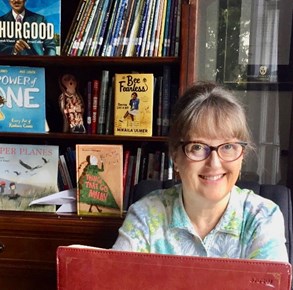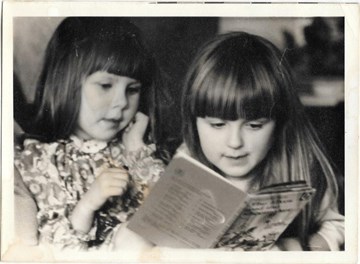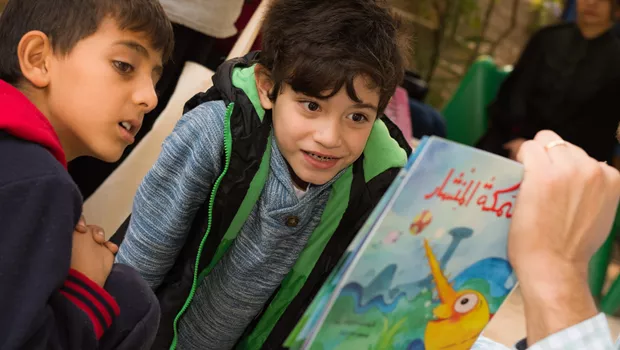Room to Read is thrilled to welcome Karen Bentall as director, library advisor, to our global literacy team!
 Karen brings an impressive range of skills from more than 20 years of working in children’s libraries. She has designed and delivered professional development to teachers, mentored first-year librarians and adult students of library science, launched innovative children’s literature programs with proven results in improving students’ literacy skills and managed community-wide projects to promote books and a love of reading.
Karen brings an impressive range of skills from more than 20 years of working in children’s libraries. She has designed and delivered professional development to teachers, mentored first-year librarians and adult students of library science, launched innovative children’s literature programs with proven results in improving students’ literacy skills and managed community-wide projects to promote books and a love of reading.
Originally from the U.K., Karen is bilingual in English and Welsh, a minority language. As a minority-language speaker, she knows first-hand the enormous benefit local language storybooks have on early readers, helping them develop both strong literacy skills and a love of reading. Over the course of her career, she has curated storybooks for children who speak more than 47 languages at home to help spark curiosity in young learners who speak minority and under-represented languages.
As director, library advisor, Karen will bring this personal and professional experience to Room to Read’s literacy team, supporting the continuous improvement of our library model around the globe. She holds a Bachelor of Science in library and information services from Aberystwyth University, and a Master of Philosophy in education from the University of Cambridge.
We recently sat down with Karen to learn more about her background and experience. Read more below!
How did you first become interested in being a librarian?
I am not sure. There was no public or school library in the Welsh village where I grew up. But I must have seen or heard about these magical places somewhere because I remember role-playing libraries with my younger brother and sister. We played at checking out our own books to one another by pretending to date-stamp the inside cover of the books.
As a bilingual person in Welsh and English, you have first-hand experience of being a minority language speaker. Why is it important for children to have access to books in their home language, especially for minority language speakers?
The benefit of a bilingual brain is one reason and the preservation of cultural heritage another. Access to books in more than one language can help offset the dangers of the “single story” that Chimamanda Ngozi Adichie warns of. As a child, I sometimes heard arguments against Welsh-language schools like the one I attended, because it was feared that students would not be fully prepared for life in a global economy. I suggest that the opposite is true. Growing up firmly rooted in both a minority and majority language helped me develop empathy and a soft spot for the underdog. I became accustomed to seeing the world through different lenses. Furthermore, the Welsh language has traditions that are uniquely wise and deep and beautiful. Reason enough to pass it on.

What was your favorite book as a child?
This is not an easy question for me. I have fond memories of reading as a child. I found joy and solace in books, but I feel conflicted about the books I read back then. Now, decades later, I realize that my childhood reading contributed to confusion and biases about gender, race and national identity. My earliest reading experiences in the 1970s involved books that I now see were peppered with problematic ideas about a white girl’s place in the world. These books shaped my psyche. Children’s books are mighty in that way. Eventually, the love of reading that those books instilled in me propelled me into becoming a mature reader. The books I have read since challenged my inner conflicts and illuminated paths to overcome them. Instead of a favorite book, I’ll offer a favorite childhood reading moment.
 This photograph shows my sister Julie (left) and me locked in a radiant reading spell. It perfectly captures the enchantment that spellbinds young readers. At the center, a point of light seems to radiate from the tip of the inside corner of the book onto my face. The glow emanates out to my sister’s hands. One hand reaches towards the pages — as if to pounce into the story — while the other rests on her face as it tilts towards the text. Around us there is darkness: a murky background, the busy pattern of Julie’s dress, our long hair draped like hooded cloaks and the indecipherable cover of a Ladybird book. There is something magical about this image that captures what reading meant to me as a child.
This photograph shows my sister Julie (left) and me locked in a radiant reading spell. It perfectly captures the enchantment that spellbinds young readers. At the center, a point of light seems to radiate from the tip of the inside corner of the book onto my face. The glow emanates out to my sister’s hands. One hand reaches towards the pages — as if to pounce into the story — while the other rests on her face as it tilts towards the text. Around us there is darkness: a murky background, the busy pattern of Julie’s dress, our long hair draped like hooded cloaks and the indecipherable cover of a Ladybird book. There is something magical about this image that captures what reading meant to me as a child.
What is something that people might not expect about the role of a librarian?
The role of a librarian is as much about people, community and the future as it is about books.
What is your favorite part of working in/with libraries?
Story time. I love it when an entire class spontaneously bursts into a round of applause over a really good book. And I love the extraordinary silence when every child is absorbed in a story. As we ponder and chat together during discussion time after the story, they begin to learn more about themselves, each other and the world around them. These magical story time experiences sow the seeds of literacy, curiosity, imagination and motivation. I have noticed that the books children experience at story time are the ones that they are eager to check out to take home to read again and again to themselves, siblings or parents.

Why are libraries and reading spaces important components of early grade literacy?
Libraries are warm, welcoming spaces where children’s curiosity and reading motivation can flourish through books and story time discussions. They are reassuring spaces where young readers can see themselves reflected in the books on display. They are expansive, imaginative spaces where they can step into the lives of others. They are spaces where emerging readers have access to books that they can and want to read. When children choose books about topics that interest them, they are more likely to persist when they encounter challenging words or concepts in the text. They are spaces where children can practice the skills of decoding that are taught in the classroom. Proficiency in these early reading skills is vital. As with any new skill, the more we practice, the better we become.
What has been your approach to getting students excited about reading?
I believe that as adults we should be careful not to make reading a competition or a chore for children. Acknowledge that learning to read is easy for some but difficult and frustrating for many. Let children know that some will need to put in more effort than others; this is true for many areas in life. Literacy is too important for us to allow children to give up on trying to read. It has been my practice in school libraries to create communities of readers where we celebrate literacy in all its guises — visual, textual, emotional, informational and more. Include every child in our joyful, inquiring, literate community. The future depends on it.

What is a project you’re excited to work on as Room to Read’s new director, library advisor?
Rather than one project, I’m eager to explore ways that our libraries can integrate many aspects of Room to Read’s vision. For example, I’m thinking about how story time practices and discussions can spur gender equality, well-being and lifelong readers who want to learn for their own good and for the good of others. As is Room to Read’s practice, I’m wondering how best to evaluate such integration. Measuring the benefit of story time discussions was the topic of my thesis at the University of Cambridge, and I am excited to further my investigations into how books can simultaneously enthrall students and develop their cognitive skills while seamlessly integrating educational standards in a global context.
What is your vision for the future of the library model at Room to Read schools?
I envision libraries where children, their teachers, librarians and their families meet the magic of quality books. A place where the experience of literature, often in the form of picture books, and the development of literary understanding will be, to quote Professor Lawrence Sipe, “an empowering and affirming force in their lives.”



